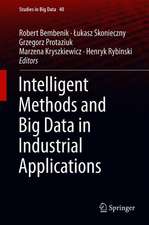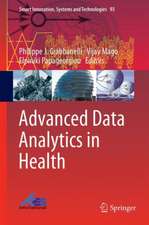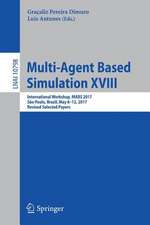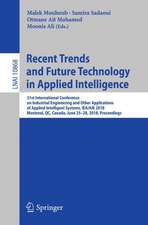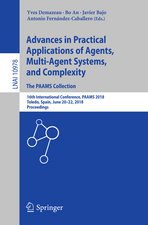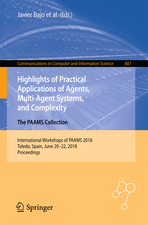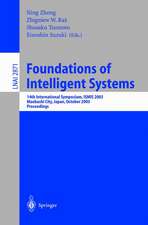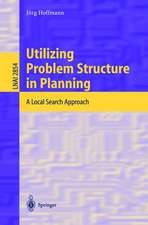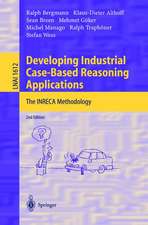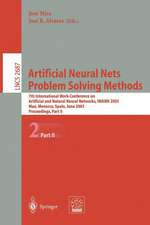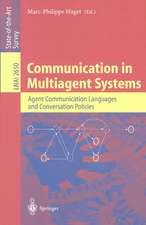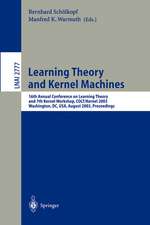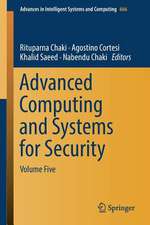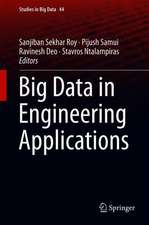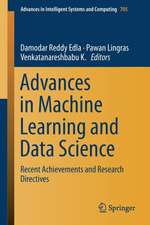Algebraic Formalization of Smart Systems: Theory and Practice: Smart Innovation, Systems and Technologies, cartea 91
Autor Natalia Serdyukova, Vladimir Serdyukoven Limba Engleză Hardback – 19 mar 2018
In 1937 L. Bertalanffy proposed the concept of an algebraic system and the development of a mathematical apparatus for describing systems. In the 1970s, A.I. Mal'tsev developed a theory of algebraic systems connecting algebra and logic for studying algebraic and logical objects. In the 1990s, the concept of purities by predicates was introduced by one of the authors, and the book includes some of its applications. The concept, which is basedon the theory of algebraic systems, allows clarification of the connections between quantitative and qualitative analysis of a system.
The book is intended for readers who use elements of artificial intelligence in their work.
| Toate formatele și edițiile | Preț | Express |
|---|---|---|
| Paperback (1) | 642.19 lei 6-8 săpt. | |
| Springer International Publishing – 24 ian 2019 | 642.19 lei 6-8 săpt. | |
| Hardback (1) | 648.44 lei 6-8 săpt. | |
| Springer International Publishing – 19 mar 2018 | 648.44 lei 6-8 săpt. |
Din seria Smart Innovation, Systems and Technologies
- 20%
 Preț: 601.32 lei
Preț: 601.32 lei - 18%
 Preț: 1111.97 lei
Preț: 1111.97 lei - 18%
 Preț: 1861.27 lei
Preț: 1861.27 lei - 20%
 Preț: 760.64 lei
Preț: 760.64 lei - 18%
 Preț: 1903.86 lei
Preț: 1903.86 lei - 18%
 Preț: 1236.99 lei
Preț: 1236.99 lei - 20%
 Preț: 1721.69 lei
Preț: 1721.69 lei - 20%
 Preț: 1287.78 lei
Preț: 1287.78 lei - 20%
 Preț: 1749.74 lei
Preț: 1749.74 lei - 20%
 Preț: 2221.63 lei
Preț: 2221.63 lei - 18%
 Preț: 2520.23 lei
Preț: 2520.23 lei - 20%
 Preț: 1337.27 lei
Preț: 1337.27 lei - 18%
 Preț: 1557.39 lei
Preț: 1557.39 lei - 18%
 Preț: 1123.35 lei
Preț: 1123.35 lei - 18%
 Preț: 1393.09 lei
Preț: 1393.09 lei - 20%
 Preț: 1738.54 lei
Preț: 1738.54 lei - 20%
 Preț: 2205.12 lei
Preț: 2205.12 lei - 18%
 Preț: 1226.11 lei
Preț: 1226.11 lei - 20%
 Preț: 1300.14 lei
Preț: 1300.14 lei - 20%
 Preț: 931.84 lei
Preț: 931.84 lei - 20%
 Preț: 1933.71 lei
Preț: 1933.71 lei - 20%
 Preț: 1778.85 lei
Preț: 1778.85 lei - 18%
 Preț: 1117.99 lei
Preț: 1117.99 lei - 20%
 Preț: 1759.63 lei
Preț: 1759.63 lei - 18%
 Preț: 952.09 lei
Preț: 952.09 lei - 20%
 Preț: 1762.94 lei
Preț: 1762.94 lei - 18%
 Preț: 1383.00 lei
Preț: 1383.00 lei - 20%
 Preț: 1922.18 lei
Preț: 1922.18 lei - 20%
 Preț: 1623.53 lei
Preț: 1623.53 lei - 20%
 Preț: 1623.53 lei
Preț: 1623.53 lei - 20%
 Preț: 2210.06 lei
Preț: 2210.06 lei - 20%
 Preț: 1618.60 lei
Preț: 1618.60 lei - 20%
 Preț: 1312.52 lei
Preț: 1312.52 lei - 20%
 Preț: 1310.88 lei
Preț: 1310.88 lei - 20%
 Preț: 1753.06 lei
Preț: 1753.06 lei - 20%
 Preț: 1456.88 lei
Preț: 1456.88 lei - 20%
 Preț: 1464.33 lei
Preț: 1464.33 lei - 20%
 Preț: 1627.65 lei
Preț: 1627.65 lei - 20%
 Preț: 1463.49 lei
Preț: 1463.49 lei - 20%
 Preț: 1923.82 lei
Preț: 1923.82 lei -
 Preț: 436.35 lei
Preț: 436.35 lei - 15%
 Preț: 641.71 lei
Preț: 641.71 lei - 18%
 Preț: 1413.76 lei
Preț: 1413.76 lei - 20%
 Preț: 1781.21 lei
Preț: 1781.21 lei - 20%
 Preț: 1756.37 lei
Preț: 1756.37 lei - 20%
 Preț: 1756.37 lei
Preț: 1756.37 lei - 20%
 Preț: 1634.59 lei
Preț: 1634.59 lei - 18%
 Preț: 1124.92 lei
Preț: 1124.92 lei
Preț: 648.44 lei
Preț vechi: 810.55 lei
-20% Nou
Puncte Express: 973
Preț estimativ în valută:
124.09€ • 134.75$ • 104.24£
124.09€ • 134.75$ • 104.24£
Carte tipărită la comandă
Livrare economică 22 aprilie-06 mai
Preluare comenzi: 021 569.72.76
Specificații
ISBN-13: 9783319770505
ISBN-10: 3319770500
Pagini: 187
Ilustrații: XXXVII, 189 p.
Dimensiuni: 155 x 235 x 15 mm
Greutate: 0.5 kg
Ediția:1st ed. 2018
Editura: Springer International Publishing
Colecția Springer
Seria Smart Innovation, Systems and Technologies
Locul publicării:Cham, Switzerland
ISBN-10: 3319770500
Pagini: 187
Ilustrații: XXXVII, 189 p.
Dimensiuni: 155 x 235 x 15 mm
Greutate: 0.5 kg
Ediția:1st ed. 2018
Editura: Springer International Publishing
Colecția Springer
Seria Smart Innovation, Systems and Technologies
Locul publicării:Cham, Switzerland
Cuprins
The Problem of General Systems Theory’s Formalization.- The Performance of a System by Using an Algebraic System of Factors Determining the System.- The Simulation of the System with the Help of Finite Group of Factors Determining the System.- External and Internal Properties of a System.- Formalization of System Links and Duality in Smart Systems Theory.- Algebraic Approach to the Risk Description.- The Transition from an Infinite Model of Factors that Determine the System to a Finite Model.- Algebraic Formalization of Sustainability Concept and Sustainability of Ranking Systems in Education.
Textul de pe ultima copertă
This book reveals the general laws of the theory of smart systems with the help of a very powerful and expressive language of algebraic formalization. It also shows how this language can be used to substantiate practical results in the field of smart systems, which previously had only an empirical justification. Further, it proposes a translation of the theory of smart systems from verbal language to a much more expressive language of algebraic formalization, allowing the laws of the theory of smart systems to be seen in a different light.
In 1937 L. Bertalanffy proposed the concept of an algebraic system and the development of a mathematical apparatus for describing systems. In the 1970s, A.I. Mal'tsev developed a theory of algebraic systems connecting algebra and logic for studying algebraic and logical objects. In the 1990s, the concept of purities by predicates was introduced by one of the authors, and the book includes some of its applications. The concept, which is basedon the theory of algebraic systems, allows clarification of the connections between quantitative and qualitative analysis of a system.
The book is intended for readers who use elements of artificial intelligence in their work.
In 1937 L. Bertalanffy proposed the concept of an algebraic system and the development of a mathematical apparatus for describing systems. In the 1970s, A.I. Mal'tsev developed a theory of algebraic systems connecting algebra and logic for studying algebraic and logical objects. In the 1990s, the concept of purities by predicates was introduced by one of the authors, and the book includes some of its applications. The concept, which is basedon the theory of algebraic systems, allows clarification of the connections between quantitative and qualitative analysis of a system.
The book is intended for readers who use elements of artificial intelligence in their work.
Caracteristici
Presents an excellent framework for the implementation of smart systems Focuses on the algebraic formalization of smart systems Combines theory and practice

